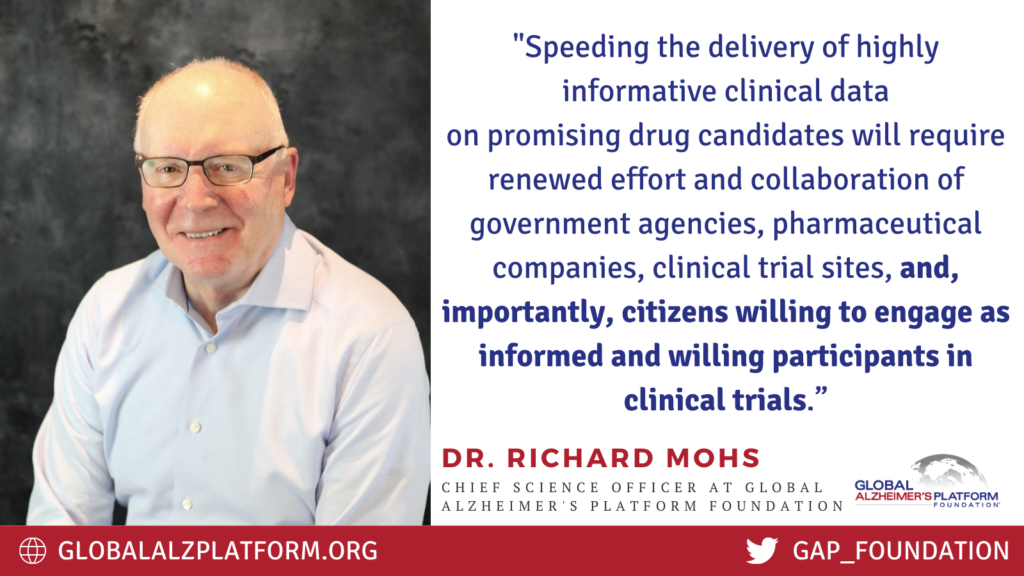Global Alzheimer’s Platform Foundation® Chief Science Officer Dr. Richard Mohs testifies at Senate hearing about the Alzheimer’s crisis.
Watch the full hearing at United States Senate Committee on Finance.
Washington, DC (December 16, 2020) – Today, the Chief Science Officer of the Global Alzheimer’s Platform Foundation® (GAP), Dr. Richard Mohs, testified before the Senate Committee on Finance, Subcommittee on Health Care about the state of Alzheimer’s Disease (AD) research, the need for greater diversity in clinical trials, and the importance of fast and low-cost blood biomarkers and digital cognitive assessments. The hearing’s topic is “The Alzheimer’s Crisis: Examining Testing and Treatment Pipelines and Fiscal Implications.” AD is the only top-ten cause of death in the United States with no treatments and no cure aside from COVID-19, and accelerating AD research progress is a priority for the incoming Biden administration.
In his testimony, Dr. Mohs explained that most physicians diagnose AD when it is far along in its course and a patient manifests clear symptoms – however, most AD clinical trials seek to enroll participants with only mild or no symptoms, when the disease is less advanced.
“The disconnect between the way patients with AD are diagnosed in clinical practice and the way research studies identify study participants is a major barrier to progress in developing new medicines,” said Dr. Mohs. “Very recently major advances have been made in the development of simple blood-based biomarker tests – the development of these tests and incentivizing their widespread use is very important.”
Dr. Mohs briefed the committee about the upcoming GAP-enabled Bio-Hermes study that will test the efficacy of several promising blood biomarkers and digital cognitive assessments. It will generate biological samples and digital biomarker data from 1,000 participants, and enable the development of a data algorithm to produce next-generation clinical trial enrollment solutions.
Despite making up about 30% of the U.S. population, Black and African American and Latino or Hispanic people usually make up only about 3-8% of AD clinical trial participants.
“To help address the issue of diversity in AD research, GAP has committed to recruiting at least 20% African American and Latinx volunteers for the Bio-Hermes study,” said Dr. Mohs. “We will not close recruitment until we have a group of study participants that accurately reflects the community of people living with Alzheimer’s disease.”
GAP will continue to recruit study participants for Bio-Hermes until at least 200 African American and Latino people out of 1000 participants have joined. Volunteer recruitment for Bio-Hermes will begin in early 2021.
“GAP is committed to building back a better AD clinical trial infrastructure from the COVID-19 pandemic; one that uses smart solutions to recruit diverse study populations and gets treatments through research and to patients faster,” said GAP President John Dwyer. “We are proud to be leading the way on blood biomarker and digital cognitive testing and making firm commitments to diversity, and we hope Congress and industry stakeholders will join us in creating a better future for AD research.”
About the Global Alzheimer’s Platform Foundation®
The Global Alzheimer’s Platform Foundation® (GAP) is a patient-centric nonprofit dedicated to accelerating the delivery of innovative therapies for neurological disorders by reducing the duration and cost of clinical trials. Research centers across the US and Canada are part of the growing GAP Network (GAP-Net). GAP supports GAP-Net research centers by assisting with study start up and recruitment activities, promoting diversity in research studies, and offering national programs that champion brain health and the citizen scientists who make research possible.
Contact: Pamela Larkin, 408-466-5952, pamelalarkin@rational360.com
